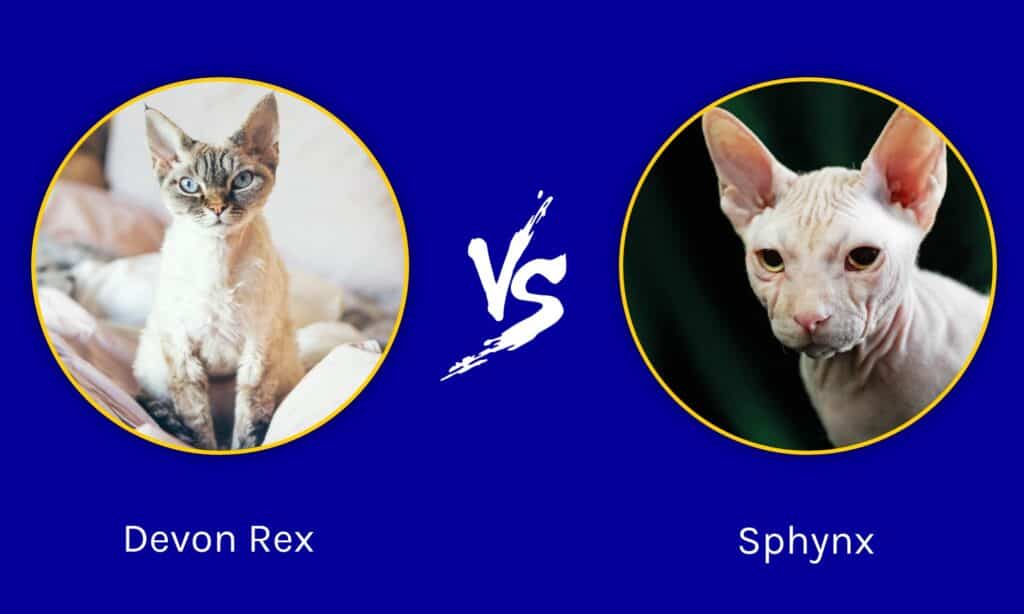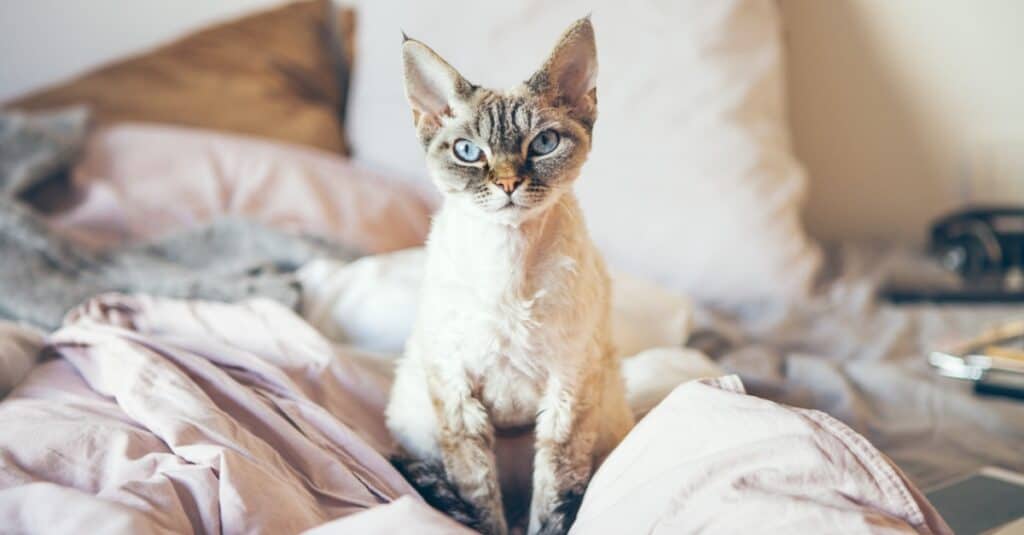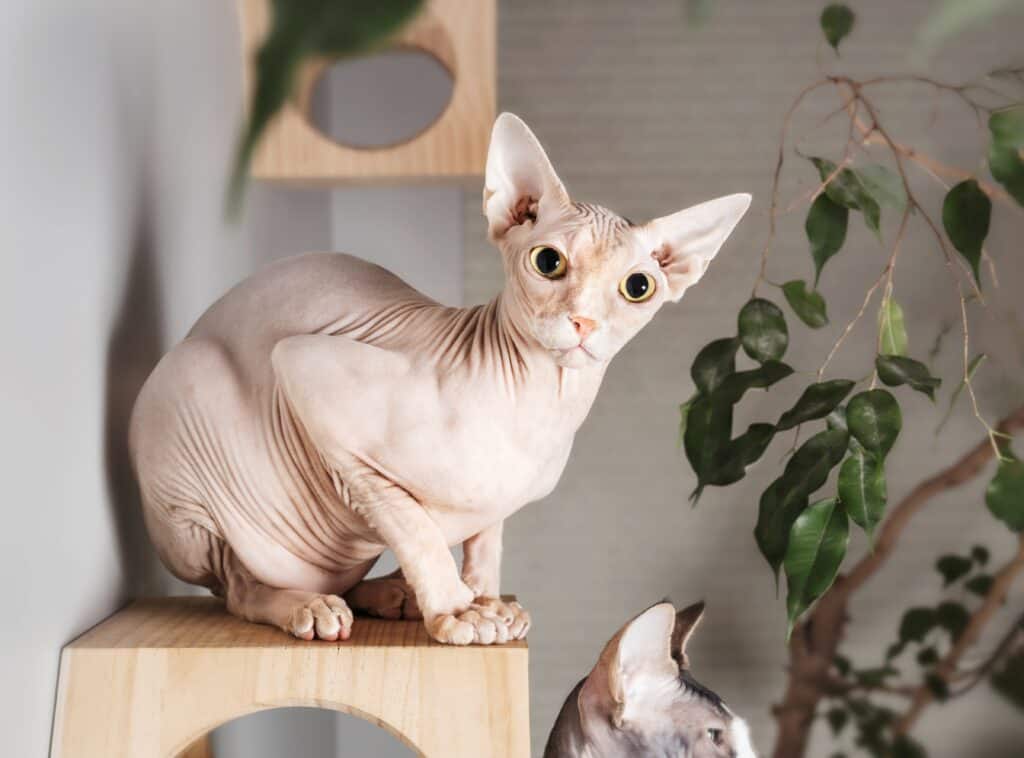Devon Rex and sphynx are two of the most unique and unusual cat breeds in the world. Both are famous for their affectionate and playful nature which makes them excellent companions. However, despite their similarities, there are actually quite a few differences between them – with some being a lot more noticeable than others. Join us as we discover everything you need to know about Devon Rex vs sphynx!
Comparing Devon Rex vs Sphynx

| Devon Rex | Sphynx | |
|---|---|---|
| Origin | Devon, UK | Canada |
| Size | 6 – 9 pounds 10 – 12 inches high | 6 – 12 pounds 8 – 10 inches high |
| Coat Type | Short, soft, and curly | Fine down |
| Ears | Large, slightly rounded, low-set | Large, triangle-shaped |
| Eyes | Oval-shaped | Lemon-shaped |
| Behavior | Vocal, energetic | Playful, devoted, loyal |
| Lifespan | 9 – 15 years | Approximately 15 years |
The 4 Key Differences Between Devon Rex and Sphynx
The key differences between Devon Rex and Sphynx are size, coat type, appearance, and behavior. Sphynx – also known as Canadian Sphynx – and Devon Rex are both fairly new breeds of cat which originated in the 1950s and 1960s. Incredibly, despite originating in different countries, both breeds are the result of selective breeding and get their coats as a result of a genetic mutation. But that’s not all there is to know, read on below to learn a few of the main differences.
Devon Rex vs Sphynx: Size

Devon Rex weighs less than sphynx but is taller in height.
©iStock.com/insonnia
The first difference between these two unusual yet unique cats is their size. Sphynx is generally heavier than Devon Rex and weighs between 6 and 12 pounds while Devon Rex weighs between 6 and 9 pounds. However, sphynx is actually usually smaller than Devon Rex in height. Sphynx stands 8 to 10 inches high at the shoulder while Devon Rex stands10 to 12 inches high.
Devon Rex vs Sphynx: Coat Type
Although both breeds can be virtually any color, the biggest difference between them is actually their coat type. Despite sphynxes appearing to be hairless at first glance, they actually have very short but soft hair. Their hair is very fine down which is what makes it so difficult to see as well as super soft. Some sphynxes have a few whiskers and eyebrows while others don’t have any at all. This “hairless” coat of sphynxes is caused by a genetic mutation that causes the structure of the hair to not function correctly. This in turn means that it is weak and easily dislodged.
Incredibly, the coat of Devon Rex is actually caused by a genetic mutation of exactly the same gene which causes the “hairless” coat in sphynxes, However, Devon Rexes also have soft and short hair, which is actually curly. According to the breed standard, the coat of Devon Rexes should have a loose curl, creating a wavy appearance. Despite this, the gene which causes the curl in their coat is actually recessive. This means that cats must have two recessive genes to get the curly hair, and the few which carry only one gene will have straight hair. Regardless of the curl of the coat, all Devon Rexes have quite fragile hair. This sometimes causes them to be completely hairless in areas where they frequently lick themselves, as well as causing their whiskers to break off.
Devon Rex vs Sphynx: Facial Features
Both Devon Rexes and sphynxes have incredibly unique appearances, and particularly unique faces. Devon Rexes have large, oval-shaped eyes with high cheekbones. They also have large ears which are slightly rounded and set low on their heads. In fact, Devon Rexes are often described as having an “elfin” appearance. In comparison, sphynxes have lemon-shaped eyes and large, triangular-shaped ears which are often described as being “bat-like”.
Devon Rex vs Sphynx: Behavior

Sphynx cats are playful and affectionate and love to be around people.
©sophiecat/Shutterstock.com
Although Devon Rexes and sphynxes have similar temperaments, there are still some slight differences in their overall behavior. Devon Rexes are incredibly energetic and like to “clown around” which makes them well suited to being around children. They are also extremely vocal and often like to hide around corners while meowing until you go to look for them. They are fearless and intelligent and thrive on praise, after which they tend to purr contentedly in return. Devon Rexes typically like to perch on high places in the house, but also crave warm, comfortable spots because of their short hair. They are also very good with virtually all other pets.
Sphynxes are also good with children as they are playful and will happily spend hours chasing toys. However, they crave attention and will happily spend hours curled up on your lap. They are incredibly loyal and devoted to their owners. In fact, they often like to supervise and even “assist” with every task you do around the house. Like Devon Rexes, sphynxes seek out warm spots and it’s not uncommon for them to hide in blankets or even climb into bed with you!
The photo featured at the top of this post is © Veera/Shutterstock.com
FAQs (Frequently Asked Questions)
How did sphynxes and Devon Rexes develop?
As we’ve already mentioned, both breeds are the result of selective breeding. However, Devon Rexes were literally stumbled upon by accident. Initially, a kitten with an unusually curly coat was found and aptly named “Kirlee”. At first it was thought that it was actually the very similar Cornish Rex, but DNA tests proved otherwise. Eventually, the genetic mutation was discovered and a breeding programme was soon under way.
Additionally, sphynxes came about when a surprise hairless kitten was born, despite his litter mates having hair. He was then bred back to his mother to produce more hairless kittens. Included in the breeding programme which was used to create the sphynxes we know today were some Devon Rexes – meaning they played an important role in the creation of the sphynx.
Are sphynxes and Devon Rexes hypoallergenic?
No, although they are often the first breeds to be associated with as being hypoallergenic, Devon Rexes and sphynxes are not actually hypoallergenic. Despite this, as their hair is so short they are actually less likely to trigger allergies than other types of cat.
Why do sphynxes have so many wrinkles?
One of the most adorable features of a sphynx is their large number of wrinkles. Yet you might be surprised to find that they actually don’t necessarily have more wrinkles than other cats. Instead, it is only because they have such short hair that the wrinkles are more noticeable than on other cats.
Are there any health concerns with Devon Rexes and sphynxes?
Yes, unfortunately there are a few health concerns with both breeds. As sphynxes have such short hair they are prone to skin conditions – such as rashes and fungal infections. They also easily become sunburnt which – along with their susceptibility to cold – means that they are most suited to being an indoor cat.
Devon rexes are susceptible to hereditary myopathy which is a condition that affects muscle function. Also, both Devon rexes and sphynxes often get a build up of ear wax which requires their ears to be regularly cleaned.
Thank you for reading! Have some feedback for us? Contact the AZ Animals editorial team.






